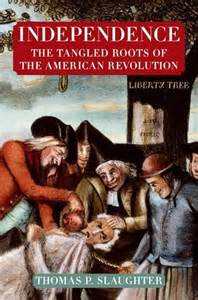ByThomas P. Slaughter. Hill and Wang, 487 pages, $35
As if there hadn’t been enough written about the American Revolution, history professor Thomas P. Slaughter (University of Rochester) looks things over and finds “tangled roots” going back to the first settlers in the early 17th century.
Prof. Slaughter points out that the settlers came here for different reasons. Puritans sought their version of religious orthodoxy. Patrician Virginians wanted to create an American landed gentry. Pennsylvania brought Quakers, Maryland favored Roman Catholics, New York started out Dutch, and South Carolina established plantations run with slave labor.
What he doesn’t mention is the fact that, except for the slaves, all were infected with a sense of adventure and daring that those they left behind did not have. What he does describe is the feeling of independence the colonists developed by striking out to tame the wilds of America.
Slaughter finds connections between the American colonies and India. He writes, “On June 23, 1757, the American Revolution also commenced on the other side of the world” in a place that American colonists, including George Washington, never heard of.
That was Plassey in rural Bengal where the British defeated the French, forcing them to begin withdrawing from India. He adds, “Plassey, along with victories in North America in 1759, helped to transform Britain’s imperial ambitions and, in short order, to bring further conflicts to the colonists in the New World.”
The British defeated the French in the battle of Quebec in 1759, driving them out of Canada. That freed the colonies from French threats along the frontier and increased pressure by settlers to cross the Appalachians and open territories as far as the Mississippi River.
But Britain’s victories had come at a huge cost and, Slaughter writes, Parliament sought to pay its bills by shifting some of the burden onto the North American colonies. The colonists, grown accustomed to smuggling and to paying low or no royal taxes for more than 100 years, objected—strenuously.
The Stamp Act, levying a tax on virtually all transactions and legal documents, was defied to the point of tarring and feathering the king’s collectors. Parliament eventually repealed the measure, but the war debt remained.
Additionally, the pressure to open the West required more troops, but the colonists, with no representation in Parliament, refused to pay the taxes to support them. There followed the Boston Tea Party, from which there are echoes even today.
After the end of the French and Indian War in 1763, the colonists were still declaring their love for King and Mother Country. Their one caveat was that their needs were not being considered by Parliament. In London, the government believed the Americans were pulling away from the Crown.
Things went from bad to worse—for the British—until events climaxed at the Battle of Concord and Lexington. Even then many Tories clung to the Crown. It was not until the Declaration of Independence on July 4, 1776, that the die was finally cast.
Slaughter’s tangled roots thesis might hold true for the first 100 years of English settlement in North America, but roots have a way of coming together to feed a single trunk, which resulted in the United States of America.
Jules Wagman has been reviewing books since 1966 and grew up not far from Concord and Lexington.
©2014 by Jules L. Wagman

